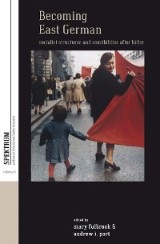Details

Becoming East German
Socialist Structures and Sensibilities after HitlerSpektrum: Publications of the German Studies Association, Band 6 1. Aufl.
|
37,99 € |
|
| Verlag: | Berghahn Books |
| Format: | EPUB |
| Veröffentl.: | 01.09.2013 |
| ISBN/EAN: | 9780857459756 |
| Sprache: | englisch |
| Anzahl Seiten: | 314 |
DRM-geschütztes eBook, Sie benötigen z.B. Adobe Digital Editions und eine Adobe ID zum Lesen.
Beschreibungen
<p> For roughly the first decade after the demise of the GDR, professional and popular interpretations of East German history concentrated primarily on forms of power and repression, as well as on dissent and resistance to communist rule. Socio-cultural approaches have increasingly shown that a single-minded emphasis on repression and coercion fails to address a number of important historical issues, including those related to the subjective experiences of those who lived under communist regimes. With that in mind, the essays in this volume explore significant physical and psychological aspects of life in the GDR, such as health and diet, leisure and dining, memories of the Nazi past, as well as identity, sports, and experiences of everyday humiliation. Situating the GDR within a broader historical context, they open up new ways of interpreting life behind the Iron Curtain – while providing a devastating critique of misleading mainstream scholarship, which continues to portray the GDR in the restrictive terms of totalitarian theory.<br>  </p>
<p> List of Abbreviations<br> Preface</p>
<p> <strong><a>Introduction:</a></strong><a> The Banalities of East German Historiography</a><br> <em>Andrew Port</em></p>
<p> <strong>Part I: Memory and Identity after Nazism</strong></p>
<p> <strong>Chapter 1. </strong>East Germans in a Post-Nazi State: Communities of Experience, Connection, and Identification<br> <em>Mary Fulbrook</em></p>
<p> <strong>Chapter 2. </strong>Divisive Unity: The Politics of Cultural Nationalism during the First German Writers’ Congress of October 1947<br> <em>Andreas Agocs</em></p>
<p> <strong>Chapter 3. </strong>Communicating History: The Archived Letters and Memories of “The Red Orchestra”<br> <em>Joanne Sayner</em></p>
<p> <strong>Chapter 4. </strong>Remembered Change and Changes of Remembrance: East German Narratives of Antifascist Conversion<br> <em>Christiane Wienand</em></p>
<p> <strong>Part II: Health, Food, and Embodied Citizens</strong></p>
<p> <strong>Chapter 5. </strong>Perceptions of Health after World War II: Heart Disease and Risk Factors in East and West Germany, 1945-75<br> <em>Jeannette Madarász</em></p>
<p> <strong>Chapter 6. </strong>Socialism Fights the Proletarian Disease: East German Efforts to Overcome Tuberculosis in a Cold War Context<br> <em>Donna Harsch</em></p>
<p> <strong>Chapter 7. </strong>The Slim Imperative: Discourses and Cultures of Dieting in the German Democratic Republic, 1949-1990<br> <em>Neula Kerr-Boyle</em></p>
<p> <strong>Chapter 8. </strong>Luxury Dining in the Later Years of the German Democratic Republic<br> <em>Paul Freedman</em></p>
<p> <strong>Part III: Constraints and Conformity: Friends, Foes, and Disciplinary Practices</strong></p>
<p> <strong>Chapter 9. </strong>Expectations, Predispositions, and the Paradox of Working-Class Behavior in Nazi Germany and the German Democratic Republic<br> <em>Andrew Port</em></p>
<p> <strong>Chapter 10. </strong>Israel as Friend and Foe: Shaping East German Society through Freund- and Feindbilder<br> <em>David Tompkins</em></p>
<p> <strong>Chapter 11. </strong>Humiliation as a Weapon within the Party: Fictional and Personal Accounts<br> <em>Phil Leask</em></p>
<p> <strong>Chapter 12. </strong>Playing the Game: Football and Everyday Life in the Honecker Era<br> <em>Alan McDougall</em></p>
<p> <strong>Afterword:</strong> Structures and Subjectivities in GDR History<br> <em>Mary Fulbrook</em></p>
<p> List of Contributors</p>
<p> <strong><a>Introduction:</a></strong><a> The Banalities of East German Historiography</a><br> <em>Andrew Port</em></p>
<p> <strong>Part I: Memory and Identity after Nazism</strong></p>
<p> <strong>Chapter 1. </strong>East Germans in a Post-Nazi State: Communities of Experience, Connection, and Identification<br> <em>Mary Fulbrook</em></p>
<p> <strong>Chapter 2. </strong>Divisive Unity: The Politics of Cultural Nationalism during the First German Writers’ Congress of October 1947<br> <em>Andreas Agocs</em></p>
<p> <strong>Chapter 3. </strong>Communicating History: The Archived Letters and Memories of “The Red Orchestra”<br> <em>Joanne Sayner</em></p>
<p> <strong>Chapter 4. </strong>Remembered Change and Changes of Remembrance: East German Narratives of Antifascist Conversion<br> <em>Christiane Wienand</em></p>
<p> <strong>Part II: Health, Food, and Embodied Citizens</strong></p>
<p> <strong>Chapter 5. </strong>Perceptions of Health after World War II: Heart Disease and Risk Factors in East and West Germany, 1945-75<br> <em>Jeannette Madarász</em></p>
<p> <strong>Chapter 6. </strong>Socialism Fights the Proletarian Disease: East German Efforts to Overcome Tuberculosis in a Cold War Context<br> <em>Donna Harsch</em></p>
<p> <strong>Chapter 7. </strong>The Slim Imperative: Discourses and Cultures of Dieting in the German Democratic Republic, 1949-1990<br> <em>Neula Kerr-Boyle</em></p>
<p> <strong>Chapter 8. </strong>Luxury Dining in the Later Years of the German Democratic Republic<br> <em>Paul Freedman</em></p>
<p> <strong>Part III: Constraints and Conformity: Friends, Foes, and Disciplinary Practices</strong></p>
<p> <strong>Chapter 9. </strong>Expectations, Predispositions, and the Paradox of Working-Class Behavior in Nazi Germany and the German Democratic Republic<br> <em>Andrew Port</em></p>
<p> <strong>Chapter 10. </strong>Israel as Friend and Foe: Shaping East German Society through Freund- and Feindbilder<br> <em>David Tompkins</em></p>
<p> <strong>Chapter 11. </strong>Humiliation as a Weapon within the Party: Fictional and Personal Accounts<br> <em>Phil Leask</em></p>
<p> <strong>Chapter 12. </strong>Playing the Game: Football and Everyday Life in the Honecker Era<br> <em>Alan McDougall</em></p>
<p> <strong>Afterword:</strong> Structures and Subjectivities in GDR History<br> <em>Mary Fulbrook</em></p>
<p> List of Contributors</p>
<p> <strong>Mary Fulbrook</strong>, FBA, is Professor of German History at University College London. Her most recent books are <em>A Small Town near Auschwitz: Ordinary Nazis and the Holocaust</em> (2012) and <em>Dissonant Lives: Generations and Violence through the German Dictatorships</em> (2011). She is currently directing an AHRC-funded collaborative project on <em>Reverberations of War in Germany and Europe: Communities of Experience and Identification since 1945</em>. A former Chair of the German History Society, and Chair of the Modern History Section of the British Academy, she has written widely on the GDR.</p>

















